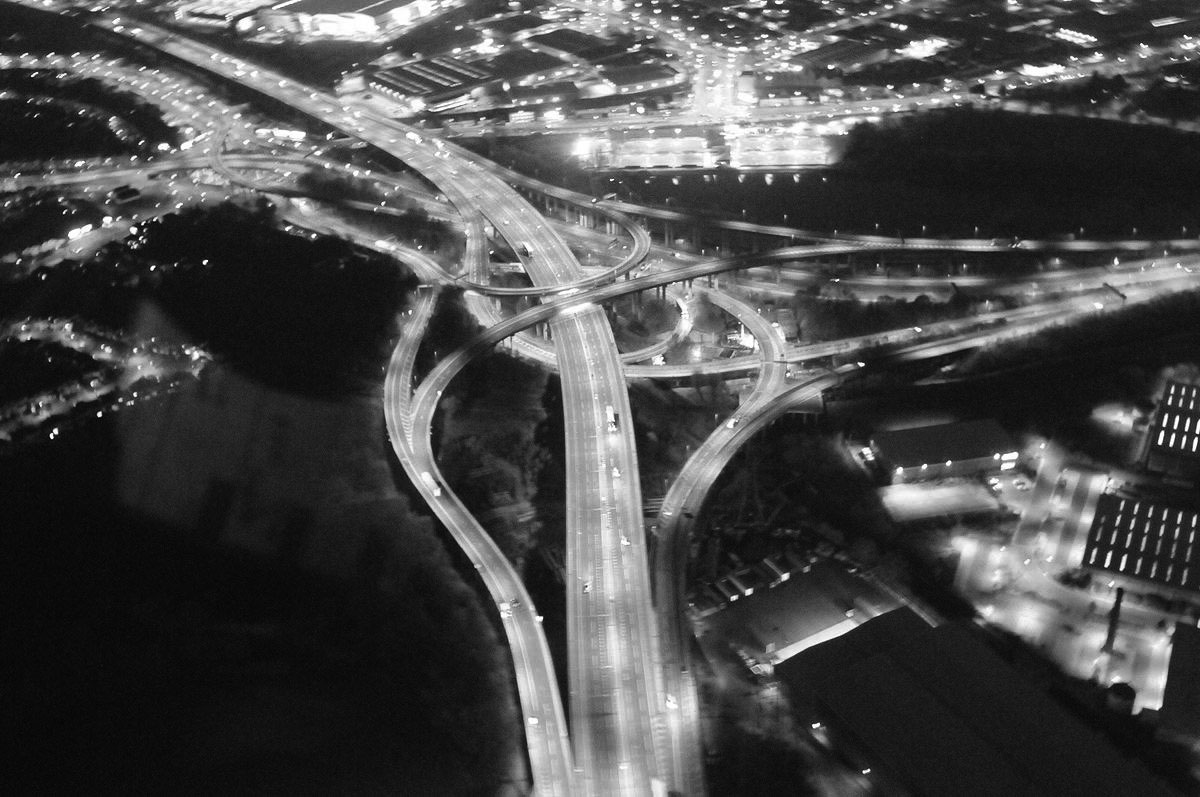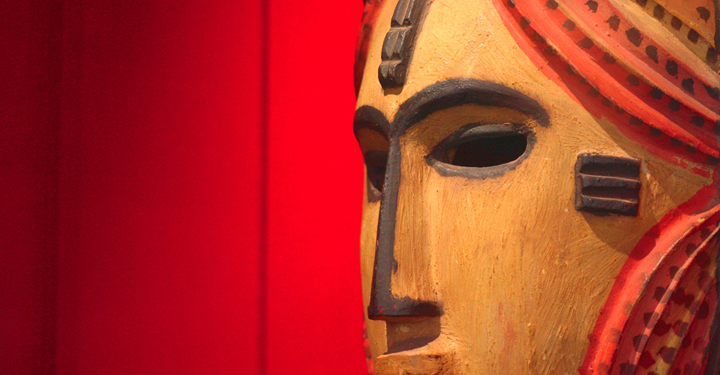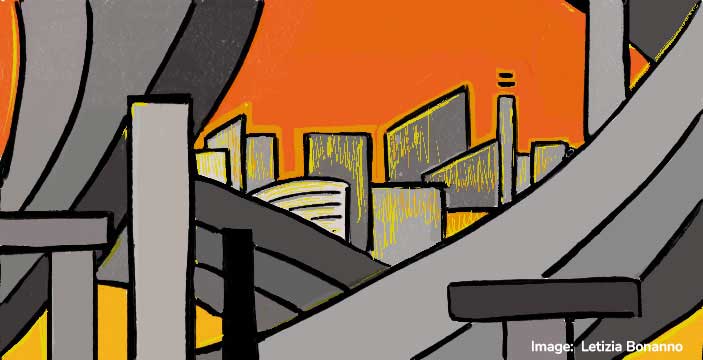Theme
Critical Junctions: Anthropology on the Move
ASA2025’s location, the city of Birmingham, is famous for its Spaghetti Junction, an interchange that allows for movement in and out of the city, across the country, and between major and minor roads. Spaghetti Junction is an entanglement of routes: built over the River Tame and three of the city’s historic canals, its roads swirl over each other at multiple levels and connect at numerous points. Due to its scale and complexity, the junction dominates the landscape – yet it is not an uncontested landmark. A collar of cars over and around the city, not only is it incomprehensible from a distance and incoherent to navigate from within; it also overdetermines travel in the region, fragments, excludes and pollutes.
Inspired by this knottiness, Critical Junctions: Anthropology on the Move invited scholars to reflect on the traffic of anthropology and its subdisciplines in the context of a world in motion. Channelled by movements both within academia and beyond, in the wider society, and in response to the tremulant geo-politics of our time, commentaries on the state of anthropology call for us to rethink the universalist horizons of early anthropology and to revisit earlier attempts to decolonise the discipline. These debates present a range of 'possible' anthropologies, or anthropologies 'otherwise', calling for us to rethink the various ways in which the discipline can shed light on the world around us and those ideas, values, and indeed people that we consider intrinsically human. In the spirit of those who have previously scrutinised the ‘critical junctions’ of the discipline (Kalb & Tak 2005), critically examined key anthropological concepts (e.g. Gupta & Ferguson 1997) and methodological journeys (e.g. De Neve & Unnithan-Kumar 2016), we invited scholars to think through the various routes and turning points that anthropology is - or could be - taking today. Anthropologists appear to be moving along various pathways from different starting points and towards multiple destinations. ASA2025 provided a place to take stock and offers a new point of departure.
As we reimagined anthropological horizons and map new possibilities for the discipline at ASA2025, we asked ourselves: where is anthropology heading? How can anthropology respond to social, political, economic, and environmental movements in the world? How should we chart anthropology’s movements? What might facilitate travel? And, equally, what could impede it? Which avenues are worth revisiting and which paths have yet to be followed? Acknowledging differences within the academy, and among our interlocutors beyond, what can we learn from each other as we find our way? What new vistas might apparently wrong turns reveal? And how can we escape from our usual vehicles and journey by other means?
With due attention to recent and ongoing challenges that shape the world in which we all live, we asked scholars to assess the current state of anthropology, giving equal weight to practical hazards and ethical concerns as to theories and concepts. How we practise anthropology in the wider context is critical to the discipline’s collaborations in its journey from fieldwork to publishing, and from classroom conversations to public engagement. Evaluating our routes may help us consider where they diverge or intersect with others. What has anthropology borrowed from other disciplines? What else might it still take on board? How might the concerns and methodologies of cognate fields help us expand our own disciplinary horizons and enrich our journeys? What can anthropology bring to the world? ASA2025 asked participants to meet these challenges head on. We exhorted scholars to twirl past, present, and future anthropologies together and concoct landmark critical junctions of their own.

contact: conference(at)theasa.org
Conference Intersections
ASA2025 was a space to consider anthropology’s journey and all the possible routes it could take. Extending the metaphor of critical junctions to the discipline, we invited panel, lab, and paper proposals across the following themes.
As lights and landmarks advance towards and then recede behind us, how do we know where we’re heading? We could navigate in relation to landmarks, read the signs, or perhaps follow the sun and stars. For better or worse, our frames of reference orient us in relation to what we find around us. And junctions follow their own logic, so it can often be hard to keep the wider horizon in mind.
We invited proposals that critically assessed anthropology’s landmarks and sought to imagine new points of departure. These included key topics of contemporary global or disciplinary concern, as well as the theoretical and analytical paradigms we regularly encounter without pausing to ponder or engage. Proposals reflected, too, on the orientation of anthropology in relation to the wider society. Who is navigating and in which direction are they pointing? Who is excluded or left behind? What are the costs of these journeys and who pays the price?
At junctions, orientations meet. Convergences enable us to change track and arrive at alternative destinations. At the same time, junctions are sites at which power is exerted and dominance achieved. Reactions can be contentious, even violent: forcing others out of the way, taking precedence and priority, halting them in their tracks. Can anthropology mobilise its inherent intellectual empathy to rehumanise minimised, marginalised, essentialised others?
We welcomed proposals that reflected on the historical and contemporary meeting points of anthropology, as well as points of convergence with other practices and disciplines. Proposals explored debates and controversies that have brought scholars together in discussion and action, as well as forms of collaboration that might improve and challenge our modes and sites of research, teaching, and acting.
Junctions facilitate prescribed movements, helping us get to some places faster. Like academic careers, they also compel certain forms of movement and prevent others. But what if that isn’t where we wanted to go? What if the traffic is too heavy? What of different paths, by different means, with other goals in mind?
We encouraged proposals that reflected on the different paths that anthropology might take, innovative forms of practice and of acting in the world that don’t look like academic anthropology, and which directed themselves to other goals, and other audiences entirely. As more and more anthropologists find themselves working outside of anthropology departments and beyond academia, what new vistas might a non-university-based anthropology offer? What possibilities are there within the academy to change direction, travel by other means, and re-route anthropology as we know it?
Travel is rarely smooth and seldom continuous; sometimes we really need to go slower or stop. ‘Fast’, after all, connotes both speedy movement and stuckness, and there’s surely a connection between the two. At junctions we wait while others pass or pause to consider which direction to take. For some, even the metaphor of motion is more aspiration than reality. What happens when we vacillate, hesitate, stutter, or stall? How do we keep moving on a planet that needs decarbonising and decolonising? How do we remain still as millions of people worldwide remain internally displaced, with their act of mobility considered a badge of disgrace.
Panels, labs, and films explored the creative potential of quiet moments, the chance to listen, to consider, to create as well as the frustration and longing that can accompany immobility. We likewise appreciated proposals that wrestled with stagnation as a form of unethical disruption. Moreover, to pause is to settle, albeit temporarily, on a position. What, we wonder, are the theoretical, ethical and representational implications of such positionality?
ASA2025 at Birmingham
We are grateful to the University of Birmingham’s College of Arts and Law for its sponsorship.
As we host ASA2025, the Department of African Studies and Anthropology (DASA) at the University of Birmingham considers critical junctions to be more than a useful trope for thinking about the discipline and its place at large. It is central to our own anthropological journey. Founded in the 1960s as the Centre of West African Studies (CWAS), the department has always been interdisciplinary. For decades, our staff were united by, and well known for, their strong empirical commitment to the study of West Africa. Over time, the department evolved in both its research and teaching, first by broadening its geographical interests to encompass the African continent and African diasporas at large, and then by centring the discipline of anthropology. These were incremental changes by which CWAS became DASA, an anthropology department shaped by its interdisciplinary and Africanist roots. For the first time in 2023, DASA employed anthropologists with regional expertise beyond sub-Saharan Africa and its diasporas, and we launched a full BA programme in Social Anthropology. If 2023 was a landmark year for the department, it also shifted our perspectives on our past and opened new horizons. By bringing ASA2025 to the University of Birmingham, we ask you to join us in disentangling individual and collective pasts and in laying a trail towards our anthropological futures.




